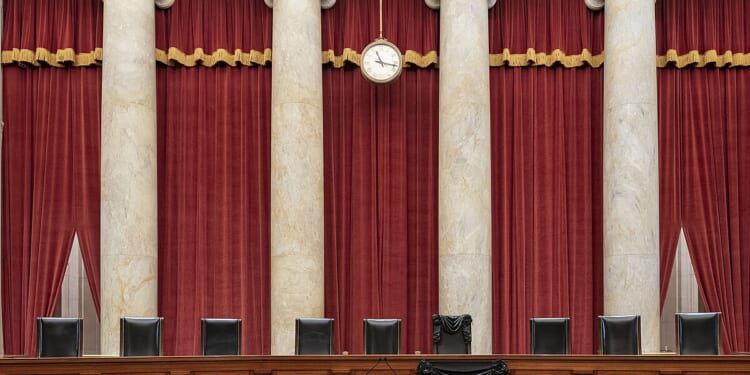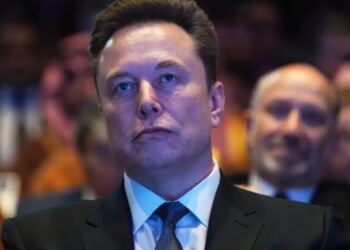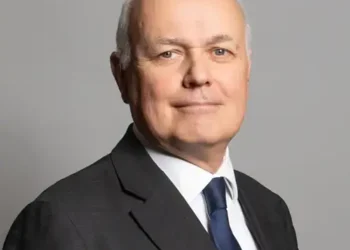The U.S. Supreme Court appeared fairly skeptical of President Trump’s implementation of numerous “emergency” tariffs in a pair of key cases before the bench on Wednesday.
The nation’s highest court held oral arguments in Learning Resources, Inc. v. Trump and Trump v. V.O.S. Selections, Inc. The cases center around the legality of Trump’s implementation of tariffs using the International Emergency Economic Powers Act (IEEPA), which grants presidents the power to “deal with any unusual and extraordinary threat, which has its source in whole or substantial part outside the United States, to the national security, foreign policy, or economy of the United States, if the President declares a national emergency with respect to such threat.”
As The Federalist previously described, the president “did so in response to existing ‘unfair trade practices’ that lead to trade deficits, as well as to punish countries like China for failing to ‘blunt the sustained influx of synthetic opioids, including fentanyl, flowing from the [People’s Republic of China] to the United States.’” Invoking language contained in IEEPA, Trump reasoned that these problems represent an “unusual and extraordinary threat” to the country.
Throughout oral arguments, justices across the ideological spectrum appeared wary of the claims put forward by U.S. Solicitor General John Sauer, who argued that IEEPA grants presidents authority to enact tariffs.
When responding to a question from Associate Justice Clarence Thomas about whether the major questions doctrine applies in these cases, Sauer said that while “the major question doctrine may apply to the president in other contexts, specifically in foreign affairs where he has his own inherent Article II authority, it is a poor fit to apply the major questions doctrine [in these cases].”
“Just as a matter of common-sense interpretation, you would expect Congress to grant major powers to the president, who has his own broad range of major … inherent Article II authority in this context,” Sauer said in part.
The answer prompted pushback from Associate Justice Elena Kagan, who questioned what specific Article II powers Sauer was “relying on.” The Obama appointee argued that “one would naturally think” that tariffs constitute a “power to impose taxes, the power to regulate foreign commerce,” and that “these are not things that are thought of as Article II powers, [but] quintessential Article I powers.”
Citing past SCOTUS cases, Sauer argued that the court has “has recognized the president has broad, inherent authority to address foreign situations.” He further contended that the administration is not arguing that the president has, “in peacetime, inherent tariffing authority” nor that “what is being exercised here is the power to tax,” but “the power to regulate foreign commerce.”
“These are regulatory tariffs. They are not revenue-raising tariffs. The fact that they raise revenue is only incidental,” Sauer said.
The dispute over the president’s tariff power also took center stage in questioning from fellow Democrat-appointed Associate Justices Sonia Sotomayor and Ketanji Brown Jackson.
Similar to Kagan, Sotomayor characterized a tariff as a “tax,” noting that the ability to enact them is “a congressional power, not a presidential power.” Addressing the solicitor general, she added, “You want to say tariffs are not taxes, but that’s exactly what they are.”
Meanwhile, Jackson contended that IEEPA “was designed and intended to limit presidential authority” — a claim Sauer took issue with. She further questioned how the government’s argument could hold up against that assumption.
The Trump administration’s position also faced scrutiny from several of the court’s Republican appointees.
Much like several of his colleagues, Chief Justice John Roberts appeared to home in on the issue of whether major questions doctrine should apply in these cases, saying, “It seems it might be directly applicable.” The Bush appointee went on to note that IEEPA has “never before been used to justify tariffs,” and subsequently echoed concerns espoused by Kagan and Sotomayor that “the vehicle is imposition of taxes on Americans, and that has always been the core power of Congress.”
Later in the hearing, the chief justice did, however, appear to express concerns about potential infringement on the executive’s power over foreign affairs. Speaking to plaintiffs’ attorney, he said, “One thing [that’s] quite clear is that the foreign-facing tariffs have, in several situations, were quite effective in achieving particular objectives,” and “I don’t think you can just separate it, and when you say, ‘Well, this is a tax, it’s Congress’s power,’ it implicates, very directly, the president’s foreign affairs power.”
Meanwhile, Associate Justice Neil Gorsuch attempted to pin down where the administration “draw[s] the line” on Congress’s delegation of its authority to the executive. He also posed a hypothetical previously put forward by Sotomayor about whether, under Sauer’s logic, the president could invoke IEEPA to “impose a 50 percent tariff on gas-powered cars and auto parts to deal with the ‘unusual and extraordinary threat,’ from abroad, of climate change.”
“It’s very likely that that could be done,” Sauer replied, adding, “This administration would say that’s a hoax, it’s not a real crisis … but that’d be a question for Congress under our interpretation, not the courts.”
In her line of questioning, Associate Justice Amy Coney Barrett pressed Sauer on the government’s central claim that IEEPA authorizes the president to “‘regulate * * * importation’ of foreign goods to address declared national emergencies.” She specifically asked the solicitor general to “point to any other place in the code or any other time in history where that phrase … has been used to confer tariff-imposing authority.”
After a short back and forth that didn’t produce a definitive answer, Barrett again asked, “Can you identify any statute that used that phrase to confer tariff [authority]?”
Sauer pointed to the 1917 Trading with the Enemies Act “as interpreted” in a prior lower court case and argued that the administration is relying on “historical sources to show that there’s this long historical pedigree of broad delegations of the foreign commerce power … to the president.”
A decision in the cases is not expected until later in the court’s 2025-2026 term.
Shawn Fleetwood is a staff writer for The Federalist and a graduate of the University of Mary Washington. He previously served as a state content writer for Convention of States Action and his work has been featured in numerous outlets, including RealClearPolitics, RealClearHealth, and Conservative Review. Follow him on Twitter @ShawnFleetwood

















